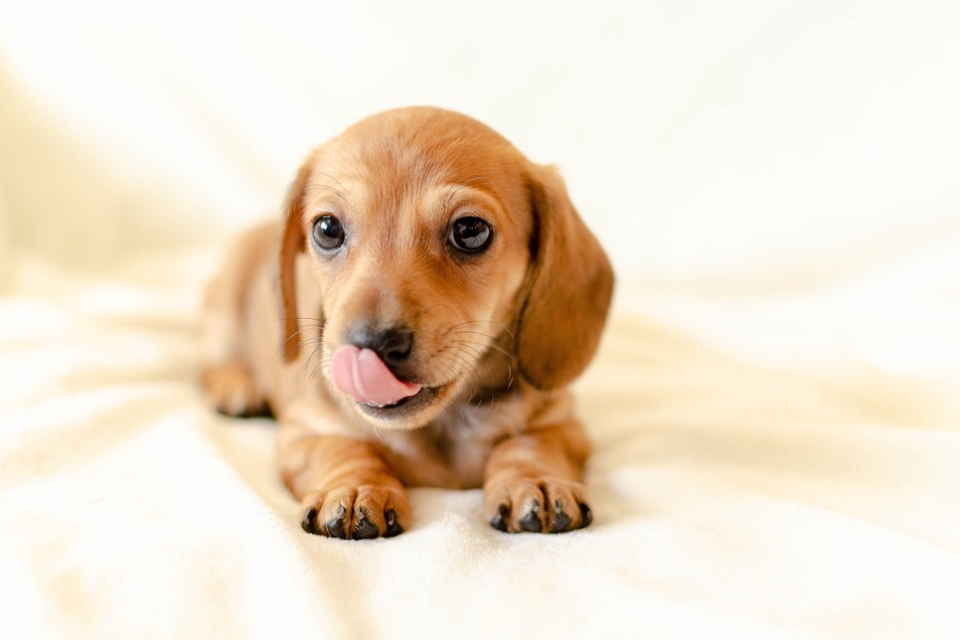Miniature dachshunds, also known as mini doxies or weiner dogs, are a small breed of dog known for their long bodies, short legs, and friendly personalities. They were originally bred in Germany to hunt badgers, but today they are primarily kept as companion animals due to their playful nature and affectionate personalities.
One common behavior that miniature dachshund owners may notice is excessive licking. While all dogs lick to some degree, miniature dachshunds seem to have a particular affinity for it. This behavior can be both adorable and frustrating, depending on the circumstances.
In the blog post In this blog post, we will explore nine different reasons why miniature dachshunds lick so much. Some of these reasons are natural and healthy, while others may indicate an underlying problem that requires attention. By understanding the different reasons why dogs lick, you can better understand and manage your miniature dachshund’s behavior.
Key Takeaways:
- Miniature dachshunds lick to show affection, mark their territory, clean themselves, explore their environment, relieve stress, and more.
- Excessive licking may be due to medical conditions, behavioral issues, boredom, or habitual behavior.
- To manage excessive licking, it’s important to identify the underlying cause and address it through medical treatment, behavior modification, mental stimulation, or redirection.
Reason 1: To Show Affection
One of the most common reasons why miniature dachshunds lick is to show affection. Dogs use their tongues as a way of communicating with their owners and other dogs, and licking is a way for them to show love and affection.
With my mini dachshund, I have noticed that she will often give me a quick lick on the hand or face as a way of showing her affection. She may also lick my feet or legs as a way of greeting me when I come home from work.
Reason 2: To Mark Their Territory
Dogs have scent glands in their mouths, which means that licking can be a way of leaving their scent on objects and people. This is particularly true for miniature dachshunds, who may use licking as a way of marking their territory.
My mini dachshund sometimes licks her bed or toys as a way of marking them as her own. She may also lick me or other family members to leave her scent on us and mark us as part of her pack.
Reason 3: To Clean Themselves
Licking is a natural behavior for dogs, and it’s one of the ways they keep themselves clean. By licking their fur, dogs can remove dirt and debris, as well as distribute natural oils throughout their coat.
My mini dachshund will often spend several minutes licking her paws and legs after coming inside from a walk. This helps her remove any dirt or debris she may have picked up on her paws.
Reason 4: To Explore Their Environment
Dogs use their sense of smell to explore the world around them, and licking is one way that they can taste and smell different objects in their environment.
With my mini dachshund, I have noticed that she will often lick new objects or surfaces to get a better sense of what they are. For example, she may lick a new toy or sniff and lick a new piece of furniture to familiarize herself with it. Licking can also be a way for them to gather information about the environment they are in, such as whether it is safe or familiar. It is important to keep an eye on your miniature dachshund during these exploration activities to ensure they do not accidentally ingest anything harmful.
It is worth noting that excessive licking to explore the environment may also be a sign of anxiety or stress in your miniature dachshund. If you notice this behavior persisting or becoming more frequent, it may be worth consulting with a veterinarian or animal behaviorist to address any underlying issues.
Reason 5: To Relieve Stress
Licking can be a natural self-soothing behavior for miniature dachshunds when they are feeling anxious, stressed or bored. When dogs lick themselves or others, it can release endorphins which can have a calming effect on them.
If your miniature dachshund is exhibiting excessive licking behavior during stressful situations such as during a thunderstorm or when meeting new people, it may be a sign that they are feeling anxious. Providing them with a comfortable and secure environment, along with plenty of exercise and mental stimulation, can help to alleviate their stress and reduce the amount of licking behavior.
Related: Why Does My Mini Dachshund Shake?
Reason 6: Due to Medical Conditions
Excessive licking can also be a symptom of underlying medical conditions such as allergies, skin irritations, or gastrointestinal issues.
If you notice your miniature dachshund licking excessively, it is important to take them to a veterinarian for an examination to rule out any potential medical issues. Depending on the diagnosis, treatment options may include changes in diet, medications, or topical ointments.
Related: Why Is My Mini Dachshund Losing Hair?
Reason 7: Due to Behavioral Issues
Excessive licking behavior can also be caused by behavioral issues such as separation anxiety, boredom or lack of mental stimulation.
If you suspect that your miniature dachshund’s licking behavior is due to behavioral issues, it is important to address the underlying problem in order to effectively treat the licking behavior. Providing regular exercise, mental stimulation and socialization can help to reduce anxiety and boredom in your pet. Additionally, seeking the advice of an animal behaviorist can also be helpful in identifying and addressing any underlying behavioral issues.
Reason 8: Due to Boredom
Boredom is a common cause of excessive licking behavior in miniature dachshunds. When dogs are not provided with enough exercise or mental stimulation, they may turn to licking as a way to relieve their boredom.
To prevent boredom, it is important to provide your miniature dachshund with plenty of exercise and mental stimulation, such as puzzle toys, interactive games or training sessions. Regular playtime and walks can also help to keep your pet active and engaged.
Reason 9: Due to Habitual Behavior
If licking behavior is not addressed early on, it can become a habitual behavior for miniature dachshunds. They may continue to lick even when there is no longer a specific reason for the behavior.
There are several ways to discourage and redirect habitual licking behavior in miniature dachshunds:
- Positive reinforcement training: This involves rewarding your dog with treats or praise when they display appropriate behavior, such as not licking excessively. This can help to reinforce good behavior and discourage habitual licking.
- Distraction: Providing your dog with a toy or chew bone can distract them from licking and redirect their attention to a more appropriate activity.
- Consistent boundaries: Setting consistent boundaries and rules for your dog can help to discourage habitual licking. For example, if you don’t want your dog to lick you or jump on the furniture, make sure to consistently enforce those rules.
- Calming techniques: If your dog is licking due to stress or anxiety, providing calming techniques such as massage or aromatherapy can help to reduce the behavior.
- Consult with a veterinarian or behaviorist: If your dog’s licking behavior is excessive and cannot be managed through training or other methods, it may be necessary to consult with a veterinarian or animal behaviorist to address any underlying medical or behavioral issues.
Conclusion
To recap, miniature dachshunds may lick excessively for a variety of reasons, including to show affection, mark their territory, clean themselves, explore their environment, relieve stress, medical conditions, behavioral issues, boredom, and habitual behavior.
While some licking behavior is normal and healthy for dogs, excessive licking can be a problem for miniature dachshunds and their owners. It’s important to understand the reasons why your dog may be licking excessively and to take appropriate steps to manage and prevent the behavior.
If you have experience with managing excessive licking in your own miniature dachshund, we encourage you to share your tips and experiences in the comments section below. By sharing our experiences and knowledge, we can help each other to better understand and care for our furry friends.

